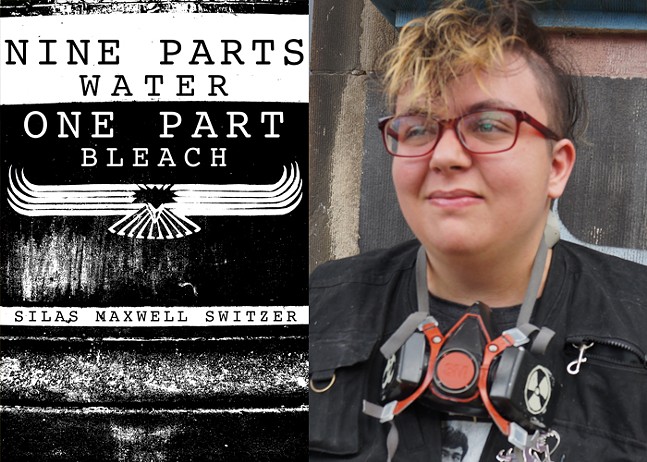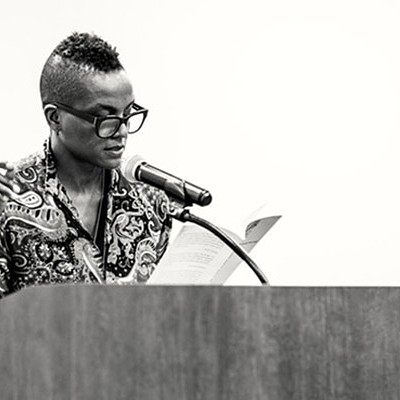Poet addresses "AIDS crisis in Pittsburgh — and its erasure" with new collection
Underneath the arch of California Avenue Bridge in Marshall-Shadeland is the four-story brick building that once housed The Eagle, a popular gay bar in Pittsburgh that closed its doors in 2012. When Silas Maxwell Switzer visited the area as research for his debut poetry chapbook, Nine Parts Water, One Part Bleach, he was struck by the sound: a steady thrum of cars passing on the loose gravel of Highway 65 overhead.
In the book, Switzer includes a QR code that links to an audio file he recorded from that spot.
“I don’t know quite what it was about the Eagle specifically,” Switzer says. “Maybe it’s because it was the first thing that I could actually grasp. It’s not a piece of information that interweaves, it’s kind of a backbone.”
In Nine Parts Water, One Part Bleach, Switzer, a sophomore history major at The University of Pittsburgh, creates poetry out of research materials in an effort to address "the AIDS crisis in Pittsburgh — and its erasure." The poems are described as being "interlaced with photos of old queer bars, or where they once stood."
The chapbook will be released by Main Street Rag in either January or February 2023. Those interested can now pre-order the book at a discounted price.
Switzer calls the chapbook a work of "docupoetry," or poetry that uses documentary techniques like research and archival work. While doing research for the chapbook — which originated out of a docupoetry course at Pitt — Switzer dove into Pitt’s archives of queer magazines, including Pittsburgh’s OUT and the Pittsburgh Queer History Project’s trove of materials.
“It’s poetry that is based in, I guess, historical reality that isn’t well known,” Switzer says. “Many things that have a lot of nuance and pieces but nothing to pull it together. As it relates to my work, documentary poetry is a way to pull a lot of things that are really hard to connect together.”
The title of the chapbook arose from Switzer’s research. It refers to a chemical solution that an AIDs crisis handbook suggests using when disinfecting one’s kitchen counters. One poem, “Last Call For Holiday Bar,” is composed entirely of materials that Switzer discovered in PQHP’s archives, particularly notecards of written memories and comments made when The Holiday, at one time Pittsburgh’s oldest gay bar, closed in 2009. Glimpses of lives flash by in the poem: “keep moving/short term relationships/some of the best times of my/meaningless life.” The poem ends on a solemn note: “for one week, we drank with/candlelight.”
Switzer’s poetry is noticeable for what isn’t there, the blank spaces in the archives that the highlights skip over. Some lines mention names, the memory of them left to the reader to imagine: “meeting a great man/David/who died of AIDS, meeting the love/of my life.”
Docupoetry allows for a chance to reclaim those people, Switzer says. “There’s a lot of queer history that isn’t clear — it’s not factual, it’s hard to parse a lot of the time,” Switzer says. “So. I think it lends itself to an art form that can fill in the gaps.”
In “i do this everyday,” Switzer evokes a monotonous routine of sickness: “count the steps to the kitchen/count the marks on my skin/compare the two, hope for the triumph/of the former so that i might live another day/alone.”
For his research, Switzer interviewed gay bar owners such as Chuck Honse, co-owner of The Holiday, to gather a sense of Pittsburgh’s queer scene. Switzer, who is queer and trans, says the chapbook gave him the chance to hear from an older generation of queer people that he wouldn’t normally meet.
“One of the reasons why I started researching queer history was because I’m of the generation that typically would have had queer elders that died in the AIDS crisis,” Switzer says. “There’s this huge generational gap. I started doing the stuff I’m doing because I wanted something to fill that gap, even if it couldn’t be a person.”
Some of his conversations with older queer people led to exchanging perspectives over facets of contemporary queer life, such as the necessity of pronouns and safe spaces. “I did receive comments that were very much like, ‘Queer people these days don’t need to receive protection or safe spaces because everything’s fine now. There’s no need from gay bars,’” Switzer says. “I think that is part of the disconnect — when the age gap gets bigger and you have nobody to bridge it, you start to get these grading perspectives. If you’re not willing to engage with that, the disconnect remains.”
Working in a docupoetry format introduced a tension between emotion and cold facts, Switzer says. Thumbing through archives of somber AIDS statistics took a toll on him, so, Switzer’s professor for the docupoetry class, Piotr Gwiazda, gave him an important piece of advice: don’t forget about yourself in the research.
“I was completely unaware of [the research] but encountering the real humanity behind it is different from just knowing it. I was working with the raw materials in a research-based manner, so, I think that the best information I got from him is a reminder that this is also a space to work through my own relationship with this stuff,” Switzer says. “I’m not just here to present this information and walk away, I am here as myself saying what I have to say about what I’ve discovered.”
Nine Parts Water, One Part Bleach. mainstreetragbookstore.com
In the book, Switzer includes a QR code that links to an audio file he recorded from that spot.
“I don’t know quite what it was about the Eagle specifically,” Switzer says. “Maybe it’s because it was the first thing that I could actually grasp. It’s not a piece of information that interweaves, it’s kind of a backbone.”
In Nine Parts Water, One Part Bleach, Switzer, a sophomore history major at The University of Pittsburgh, creates poetry out of research materials in an effort to address "the AIDS crisis in Pittsburgh — and its erasure." The poems are described as being "interlaced with photos of old queer bars, or where they once stood."
The chapbook will be released by Main Street Rag in either January or February 2023. Those interested can now pre-order the book at a discounted price.
Switzer calls the chapbook a work of "docupoetry," or poetry that uses documentary techniques like research and archival work. While doing research for the chapbook — which originated out of a docupoetry course at Pitt — Switzer dove into Pitt’s archives of queer magazines, including Pittsburgh’s OUT and the Pittsburgh Queer History Project’s trove of materials.
“It’s poetry that is based in, I guess, historical reality that isn’t well known,” Switzer says. “Many things that have a lot of nuance and pieces but nothing to pull it together. As it relates to my work, documentary poetry is a way to pull a lot of things that are really hard to connect together.”
The title of the chapbook arose from Switzer’s research. It refers to a chemical solution that an AIDs crisis handbook suggests using when disinfecting one’s kitchen counters. One poem, “Last Call For Holiday Bar,” is composed entirely of materials that Switzer discovered in PQHP’s archives, particularly notecards of written memories and comments made when The Holiday, at one time Pittsburgh’s oldest gay bar, closed in 2009. Glimpses of lives flash by in the poem: “keep moving/short term relationships/some of the best times of my/meaningless life.” The poem ends on a solemn note: “for one week, we drank with/candlelight.”
Switzer’s poetry is noticeable for what isn’t there, the blank spaces in the archives that the highlights skip over. Some lines mention names, the memory of them left to the reader to imagine: “meeting a great man/David/who died of AIDS, meeting the love/of my life.”
Docupoetry allows for a chance to reclaim those people, Switzer says. “There’s a lot of queer history that isn’t clear — it’s not factual, it’s hard to parse a lot of the time,” Switzer says. “So. I think it lends itself to an art form that can fill in the gaps.”
In “i do this everyday,” Switzer evokes a monotonous routine of sickness: “count the steps to the kitchen/count the marks on my skin/compare the two, hope for the triumph/of the former so that i might live another day/alone.”
For his research, Switzer interviewed gay bar owners such as Chuck Honse, co-owner of The Holiday, to gather a sense of Pittsburgh’s queer scene. Switzer, who is queer and trans, says the chapbook gave him the chance to hear from an older generation of queer people that he wouldn’t normally meet.
“One of the reasons why I started researching queer history was because I’m of the generation that typically would have had queer elders that died in the AIDS crisis,” Switzer says. “There’s this huge generational gap. I started doing the stuff I’m doing because I wanted something to fill that gap, even if it couldn’t be a person.”
Some of his conversations with older queer people led to exchanging perspectives over facets of contemporary queer life, such as the necessity of pronouns and safe spaces. “I did receive comments that were very much like, ‘Queer people these days don’t need to receive protection or safe spaces because everything’s fine now. There’s no need from gay bars,’” Switzer says. “I think that is part of the disconnect — when the age gap gets bigger and you have nobody to bridge it, you start to get these grading perspectives. If you’re not willing to engage with that, the disconnect remains.”
Working in a docupoetry format introduced a tension between emotion and cold facts, Switzer says. Thumbing through archives of somber AIDS statistics took a toll on him, so, Switzer’s professor for the docupoetry class, Piotr Gwiazda, gave him an important piece of advice: don’t forget about yourself in the research.
“I was completely unaware of [the research] but encountering the real humanity behind it is different from just knowing it. I was working with the raw materials in a research-based manner, so, I think that the best information I got from him is a reminder that this is also a space to work through my own relationship with this stuff,” Switzer says. “I’m not just here to present this information and walk away, I am here as myself saying what I have to say about what I’ve discovered.”
Nine Parts Water, One Part Bleach. mainstreetragbookstore.com



















